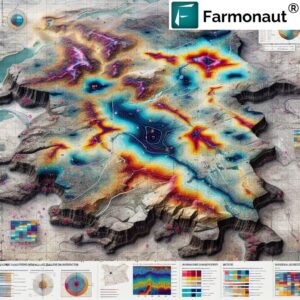Rural Market Infrastructure Boost: N3.5B Oyo Upgrade Spurs Growth
Discover how rural market infrastructure in Oyo State is transforming agriculture with modern facilities, improved roads, and enhanced market access.

حصاد القمح في القليوبية: 30 فدان تدعم الإنتاجية المحلية
حصاد القمح في القليوبية يُبرز جهود الزراعة المستدامة، دعم المزارعين، وتوفير التقاوي عالية الجودة لتحسين الإنتاجية والمستوى المعيشي.

Coffee Farming in Othaya: 5 Proven Ways to Boost Family Returns
Explore coffee farming in Kenya, succession planning, and strategies to increase yields, engage youth, and enhance coffee plantation management and

5 Key Steps for Resilient African Agriculture and Food Systems
Explore Africa’s agricultural transformation as new strategies boost sustainable food systems, resilient agrifood systems, and economic growth—learn more.

Canada United States Trade: 7 Powerful Shifts Impacting Economies
Explore the evolving Canada United States trade, economic relationship, and impact of Canadian trade agreement on national economies and industry

Climate Research Platform: 7 Powerful Ways Montreal Safeguards Data
Discover how a climate research platform centralizes data, protects scientific reports, and supports sustainable development amid threats and censorship.

Graphene Concrete Solutions: 5 Powerful Ways Canada Cuts CO2
Discover the latest in sustainable construction as nanomaterials and graphene concrete solutions boost durability, reduce CO2, and advance eco-friendly trends.

How Federal Cuts Impact Bitterroot National Forest Jobs in Hamilton
Explore the economic impact of federal job cuts on Hamilton’s rural economy, forest service, labs, and the community’s future in

أسعار البقالة في كندا 2024: استقرار ملحوظ وتوقعات
تعرف على أحدث توقعات أسعار البقالة في كندا، وتأثير التضخم، وقيمة الدولار، وتغيّر العرض والطلب على السلع الغذائية في موسم

Quebec Agriculture: 5 Powerful Trends Shaping Education and Commerce
Explore Quebec agriculture, educational trends, international exhibitions, and government boards shaping the province of Canada’s agricultural future.

5 Key Agriculture Breakthroughs in Australia, Singapore, India Deals
Explore Australian, Singapore, India, and Angola agreements in agriculture, technology, and culture; discover global leaders and key industry trends now.

Canada United States Trade: 5 Powerful Implications for the Economy
Explore Canada United States trade, Canadian economic dependence, and free trade agreement impacts on markets, energy, industry trends, and national

Climate Research Database: 7 Powerful Ways Montreal Protects Data
Explore a centralized climate research database for open access to environmental data, scientific reports, and proactive protection of climate change

Federal Jobs in Montana: 7 Critical Impacts on Hamilton’s Economy
Explore how federal jobs in Montana, Bitterroot National Forest employment, and funding cuts reshape Hamilton’s economy and threaten rural community

أسعار البقالة في كندا 2024: استقرار ملحوظ وتوقعات
تعرّف على استقرار أسعار البقالة في كندا وسط تغييرات أسعار السلع الغذائية، تأثير العرض والطلب، وارتفاع الدولار الكندي بعد جائحة

Quebec Agriculture: 7 Powerful Trends Shaping the Province
Explore Quebec agriculture, provincial agricultural boards, and Montreal chamber of commerce’s role in international exhibitions and French agricultural education.

Canada US Trade Relations: 5 Powerful Trends Shaping Ottawa’s Economy
Explore Canada US trade relations, economic dependence, energy exports, and impacts of tariffs on the Canadian economy. Discover key industry

6 Top Automotive Courses for Saskatchewan High School Students
Explore hands-on automotive courses for high school students, learn mechanical skills, and discover career options in Saskatchewan’s growing training programs.

Hamilton Montana Jobs Crisis: 7 Key Impacts on Local Economy
Discover how hamilton montana jobs and bitterroot national forest employment cuts threaten local economy, public safety, and main street businesses.

Canada’s Federal Plastics Registry: 7 Key Business Reporting Rules
Discover how new canadian environmental protection act rules transform plastic waste reporting requirements for businesses—learn how to stay compliant.

أسعار البقالة في كندا 2024: مؤشرات استقرار مذهلة وتوقع
أسعار البقالة في كندا تستقر رغم التضخم، بفضل ارتفاع الدولار وقوة العرض؛ تعرّف على توقعات أسعار السلع الغذائية وتأثير سلسلة

Athabasca Basin Uranium Exploration: 5 Powerful Geophysical Insights
Explore the latest in Athabasca Basin geophysical survey data integration, airborne magnetic and radiometric surveys, and uranium exploration in Saskatchewan.

Vietnam Canada Trade Opportunities: 2025 Market Trends & Growth
Explore Vietnam Canada trade opportunities, supply chain trends, and rising Vietnamese food exports. Discover insights on market growth and CPTPP

Agriculture in Quebec: 7 Powerful Trends Shaping Its Legacy
Explore the history of agriculture in Quebec, agricultural education, and Montreal chamber of commerce’s role in shaping Canada’s agricultural industry.

OECD Southeast Asia 2025: Boosting Trade, Agriculture & Investment
Explore OECD Southeast Asia Regional Programme, Thailand OECD membership, and Laos development in trade, infrastructure, agriculture, and investment.

Ukraine War Relief: 5 Powerful Ways Peoria Aids Turnopil Refugees
Ukraine war relief efforts bring construction, dental, and mental health aid to refugees in Turnopil—discover impactful projects helping displaced Ukrainians.

Hydrogen Fuel Cell Trucks Revolutionize Anaheim Logistics in 2025
Explore hydrogen fuel cell trucks, sustainable transportation solutions, and advanced powertrain technology shaping the future of zero-emission drayage fleets.

Cleveland Riverfront Park: 5 Powerful Changes Shaping Greenspace
Discover how Cleveland riverfront park and Irishtown Bend trail transform urban greenspace, protect riverbank soil, and boost access to metroparks

7 Growth Strategies for Commercial Banking Services in Sacramento
Discover leadership in commercial banking services, agribusiness lending, and small business loans plus strategies for growth in key markets and

PFAS Contamination in San Diego: 7 Urgent Actions for Clean Water
Explore the latest EPA actions tackling PFAS contamination in water, air, and soil, new testing strategies, and the human health

Seguin Vegetation Management Equipment: 2025 Market Insights & Trends
Explore key market updates on vegetation management equipment, tractor mowing, and infrastructure maintenance solutions across North America and beyond.

Civilian Conservation Corps: 7 Powerful Impacts on New York’s Parks
Discover how Civilian Conservation Corps camps drove New Deal conservation projects, planting trees and building public lands across New York’s

Florida Citrus Industry: 7 Powerful Ways Polk Farmers Battle Greening
Discover the future of citrus trees and orange groves in Florida—explore citrus farming challenges, greening disease, and sustainable agriculture practices.

Biosolids Moratorium in Voorheesville: 5 Urgent Health Risks Uncovered
Biosolids moratorium debated as biosolids contamination threatens well water; explore health risks, forever chemicals, and statewide advocacy efforts.

Fish Waste Fertilizer: Transforming Leelanau’s Sustainability in 2022
Discover how sustainable fish waste management and tribal traditional farming methods enhance Great Lakes fishery sustainability and eco-friendly farming.

Arkansas Farm Family of the Year: 5 Inspiring Community Leaders
Discover how Arkansas farm families lead in sustainable agriculture, community development, and conservation of natural resources. Read more for insights!

Azalea Festival: 7 Key Tips for Vibrant Blooms in Washington
Discover azalea varieties, best soil for azaleas, planting tips, sunlight needs, and how to boost blooms from spring to fall

5 Effective Native Seed Preservation Methods in Bismarck Communities
Discover how tribal seed banks and native seed preservation empower sustainable agriculture, protect culture, and open pathways for future generations.

Utah Economy: 7 Powerful Ways Immigrant Workers Drive Growth
Utah’s economy and immigration policies shape the vital role of immigrant workers in agriculture, Latino businesses, and state labor shortages—discover

EPA Actions Propel Clean Water and Air Quality in Texas and West
Explore key environmental protection actions, state programs, clean water initiatives, and air quality standards shaping the future of environmental policy.

Regenerative Coffee Farming Boosts Yields and Incomes in Kenya, Uganda
Discover how regenerative coffee farming and sustainable agriculture practices boost smallholder incomes, improve yields, and reduce greenhouse gas emissions.

Farm Robotics Challenge: 5 Innovative Solutions From North Dakota
Explore the latest in farm robotics challenge: precision weeding systems, autonomous drones, and sustainable weed control innovations transforming agriculture.

Knox County Wind Energy Projects: 5 Key Impacts of the Proposed Ban
Explore Knox County wind energy projects, zoning regulations, and the impact of a potential wind and solar project ban on

Spinach Antimicrobial Peptides: Boosting Texas Citrus & Potato Yields
Discover how spinach antimicrobial peptides offer innovative disease resistance in crops like citrus and potatoes, promising broad-spectrum crop protection.

Santa Rosa County Farmland: 7 Powerful Steps for Rural Protection
Explore rural protection zone strategies, zoning for farmland protection, and sustainable land development amid urban pressures in Santa Rosa County.

Free Mulch New Jersey: 7 Powerful Ways to Boost Sustainable Gardens
Discover where to get free mulch in New Jersey! Local recycling centers offer soil, compost, and landscaping materials for sustainable

Community Garden Nutrition: 7 Inspiring StoryWalks in Machias
Explore community garden nutrition, outdoor reading for families, and healthy recipes for kids—discover seasonal activities for wellness and fun!

4 Sustainable Agriculture Strategies to Boost Costa Rica’s Competitiveness
Explore sustainable agriculture in Costa Rica—learn how innovative programs boost small producers, climate resilience, and access to international markets.

Vermont Farms: 7 Inspiring Stories of Sustainable Community Life
Explore farm life in Vermont as a vibrant farming community faces farm retirement, land challenges, and sustainable practices in northern

7 Key Tips to Follow Brevard County Fertilizer Ordinance for Lagoon Care
Discover Brevard County fertilizer ordinance, rain impacts, shoreline restrictions, and landscaping tips to protect the Indian River Lagoon from pollutants.